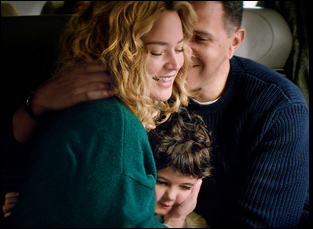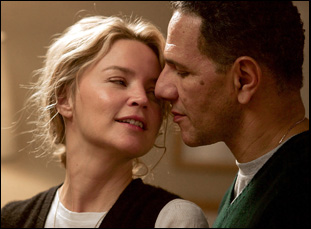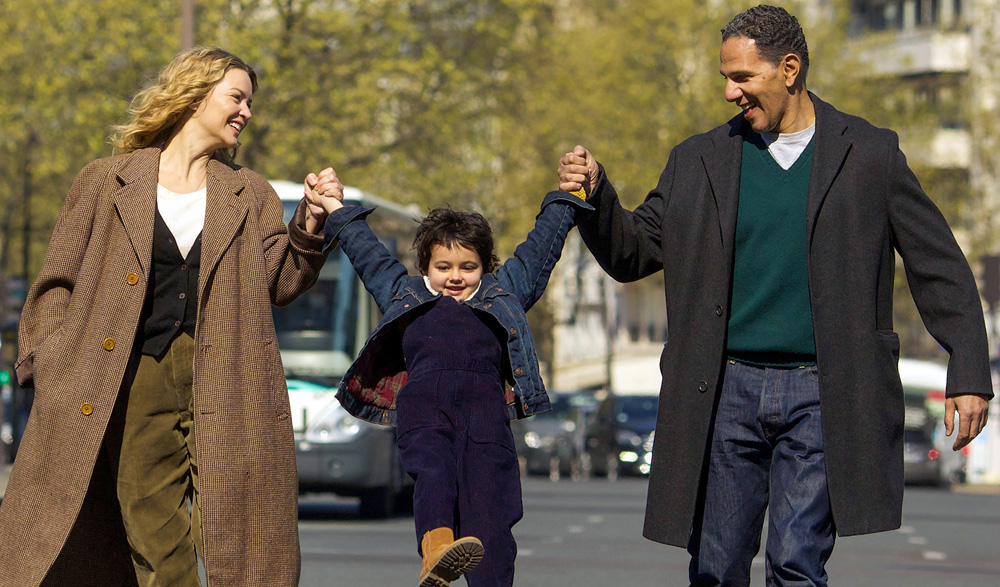The opening of “Other People’s Children” unfolds so gracefully you aren’t supposed to take notice of how complicated it must’ve been to pull off as a camera from afar scales up the side of the multilevel school where Rachel Friedmann (Virginie Efira) teaches, each classroom a world unto itself with the different subjects being taught are reflected in the panoply of lights emanating out into the night sky. Rachel, all on her own has such radiance, though the fluorescents have been dimmed in her class so they can watch Roger Vadim’s 1959 adaptation of “Les Liaisons Dangereuses” to accompany their reading, and she lingers in the back as their eyes are fixed on the screen, enjoying the text messages she receives about what she can expect after she gets off work — envisioned by writer/director Rebecca Zlotowski like the sturdy building she’s standing in — holding various lives inside of her.
There was more kicking around than even Zlotowski herself could expect from her fifth feature, initially planned as a straightforward adaptation of the Romain Gary novel “Your Ticket Is No Longer Valid,” in which Roschdy Zem was set to play a former revolutionary racked with self-doubt as he confronts his diminishing virility, but the filmmaker who has often expressed her personality most in her boldly imaginative approach to storytelling rather than in the story itself found she was putting in more and more details from her life that she’d usually leave off in the margins. In shifting the focus from the character that was to be played by Zem, who admirably didn’t waver from his commitment to the project, to the woman in his life, a vibrant new love who isn’t there to restore his confidence, but to reveal concerns of her own as she steps gingerly into the role of a stepmother to his daughter, Zlotowski may have inadvertently penned her most daring film to date when she had to be convinced her own experience of becoming a parent to her boyfriend’s kids from a previous relationship was worthy of the big screen.
“Other People’s Children” resoundingly affirms that it is, a dazzling picture anchored by an irresistible turn from Efira as Rachel, who at once couldn’t be more compassionate towards others as she surrenders to all that a life with Zem’s Ali comes with when she loves him so much, a feeling that extends to his four-year-old Leila (Callie Ferreira-Goncalves) and even her mother Alice (Chiara Mastroianni), yet has to wonder how much of her own ambitions, including potentially having children of her own, she can hold onto without being eclipsed by his. Following her lead, the film effortlessly moves between a playful romance to an introspective drama where Rachel’s love for Ali is never in question, nor is an audience’s for her, but the obstacles to sharing a life together equitably are brought into sharp relief and when Zlotowski leans into the real details of her life, such as casting her own father Michel Zlotowski as Rachel’s father, it can feel impossibly intimate yet transcendent in how generous it is towards everyone on screen and enabling everyone to travel to the City of Lights, which the director’s frequent collaborator George Lechaptois films so affectionately.
With the film bound to make waves as it arrives on American shores this week after premiering at the Venice and Toronto Film Festivals last fall, the director spoke about what ultimately compelled her to go all in on the film, working with Efira, the tender stylistic touches in its scene transitions and soundtrack and finding a part for the great documentarian Frederick Wiseman.

I think it’s the political moment we’re experiencing that gave me the strength to feel entitled to tell this story. The first [idea] I had, when I said that it was too small, it’s all the terminology we have as far as women’s stories are involved and I felt that it was not only a mistake [to think that], but also a terrible misunderstanding of the situation and the [mindset] that we have politically. When I talked to my producer, I understood before you make a film, you need to be sure that maybe one or two things are united – the first is it has to be very personally important to you, and I’m not very romantic about conception of creation, and the second is that it has to be vital to other people because [otherwise] it would be just a therapeutic [to only myself]. When I start to write a movie, I just test a little bit what’s the echo of the subject around me? And I was surprised enough with this one enough to say that this trivial history was shared by so many people around me and it gave me the strength to try and see what would happen. I had this very specific beginning that it was an adaptation of a novel, and because this novel interests me – I understood this is like the impotency of a woman and [I developed] the cinematographical form of the film, I just opened [myself up to it] and it takes several layers that allow you to do that, but all the layers are there in the film now.
The film doesn’t only touch in autobiographical elements of your life, but that’s actually your father in the film, for example. Did you actually have to personalize it in order for it to make sense as a story?
That’s pretty accurate. It’s not because I lived it and because it’s my own experience that it’s more credible or even more interesting, but the fact that we were like experiencing the pandemic all around the world and especially in Paris, the city was locked down, so I had this whole open-air studio at my disposal. But I had to to feel it and in order to feel it, sometimes you have the simple and very easiest way, which is when you need a grave to pray in front of, and you need to have the rights of the grave, it’s easier if it’s your mom’s. When I wrote the character of the father, I had Michel, my father, in my head, and the way he talks, and he was really involved in the creation of this character. And it happened that he was very available and very cheap. [laughs]
But it’s the same in a way with Roschdy and Virginie, who are two amazing actors, but also two people I like to hang out with and it was part of the process of this film. There’s a certain perfume that exhaled from the film that is the simplicity of it, and may be the reason why it feels true in a way. [Initially] I was like, “This is going to be like ‘Shoot the Moon’ from Alan Parker. People are going to see that it’s very autobiographical, but I don’t give a fuck. Let’s do it because you know it’s my fifth one and I feel that it’s worth telling. Maybe I’m going to be shy, maybe I’m going to be ashamed, but let’s do it.”
The music cues feel quite instinctive. Were they in mind from the start?
Absolutely, from the start. [Someone else] asked me, “What’s the main inspiration?” And I was like, “Probably my Spotify weekly playlist.” [laughs] That led me to this final concerto from Shostakovich that is so powerful and inspiring at the very beginning of writing the script, and then the “Pannonica” [score] from Thelonious Monk in the [Roger] Vadim adaptation of “Les Liaisons Dangereuses,” and the jazz and classical music, [which are] pretty romantic from 19th century and early 20th century were the beginning of the perception of the city, the heart of the people, and the kind of narration I would follow. I wanted deeply the film to look classical — even formally classical [where] I’d have in the first row, the incarnation of the actors and actresses.
I loved the camera style in this that gradually seems to close the distance – you start out from afar and then come in throughout the film. How did that develop?
I’ve been working with George Lechaptois, my DP from Spain, for two films where we want to lock the camera, but I have very long focal lenses, so we’re always at the 200 or 300mm, and it creates a certain intimacy with the skins of the characters, but it gives the space for the actors and actresses to play even if they’re far away. It also blurs the background, which makes it easy when you do not have that much money for a film because you do not have to care about what’s [in the background], especially when there’s no one behind because it’s in the middle of a pandemic and you just have the lights.
I also feel it creates something very musical in the film and that was literally the principle of this one because the challenge of the film would be the passing of a year, which is like the most epic timeline that I’ve had in my entire [filmography], so the iris closing and opening with the hand – we call it “la mano negra,” the dark hand and that’s just the DP who does that to show the passing of the seasons in the film.

It’s always the hand. It’s not mechanical because the iris is just a dark thing that you open and close, but the hand was much more like caressing, it’s much more organic. It was difficult to coordinate, so this time I decided to do something different. We just had passings with the hand on something black, and then we added it [later] with my editor where we wanted because it sometimes with the actress, she gives something so special at the very last second of the shot, you’re like, “Fuck!” Because you just like, you blurred her. [laughs] And I didn’t want it to happen again, and I knew for sure where [the hand] would be positioned, but I didn’t want to miss anything from the actors and actresses.
I could certainly understand not wanting to miss a second of the actors — in particular, was there anything Virginie Efira brought to this you could be really excited about?
So many things to say because I feel that Virginie is probably the person and the actress that can embody most fulfillment itself — sexually, intellectually, in her social life. You can tell that when you look at this woman that she’s full of life and this was the starting point of the character for me because I really wanted, and this was a political statement, not to depict a child-free woman as a bitter or lacking person. I wanted to depict her entire strengths and possibilities and potency and [Virginie’s] the most powerful person I’ve ever met — joyful and full of humor and full of sexuality.
Then we had to [develop] the character together through one year where [Virginie] would be happy enough to be the character we want to live with, but also moved enough by life in order to feel empathy with what she’s experiencing and what she’s living through. And I feel she could give all that in a glance. Honestly, I don’t know how she does that, like when she says goodbye to the child and she’s just moves her head to say goodbye in the last moment she sees her because there’s never fabrication of fake sympathy. There’s never affectation of the emotion, but it’s still 100% moving. Maybe that’s why it took me so many films to go to her because she has a strength that sometimes it’s difficult to handle when you are not prepared for it.
And this was your first time working with children, right? It’s a beautiful performance that Callie Ferreira-Goncalves gives.
Yeah, what scared me most was working with the child. I wasn’t sure I would be able to have a very good relationship with this actress the way I have with others. That’s why when I wrote the script she’s not the hero of the film, but she’s the subject because I didn’t want to put on her shoulders the necessity to be a good actress, so even if she had been a lousy actress, it would have still been interesting because we can feel the stakes of the film upon her, not on the incarnation of what she is. But then I was lucky enough to have like an amazing actress as well and I discovered with her the kind of things that I discover with other actors. For instance, she didn’t like rehearsal. You have actors that love that and need that, but she didn’t want to. She was like, “This is for fake. Just wait for the camera, it’s on, and I’m going to do that.” [laughs] And she did it. At the end of the shoot, I was like, “Okay, let’s not rehearse. Callie, okay, go, shoot,” and she was perfect.
We understood how to work together, even when there were a lot of lines of dialogue, because I knew I was bringing someone into the industry and this would be co-working together. She was fully prepared for that and she was surrounded by a good family. [The scenes] would be very complicated to learn by heart, so I would adopt a parrot way of saying [the lines] before and she would repeat them, but I was scared in the beginning and then she put me at ease.
The other bit of casting that I was so curious about was Frederick Wiseman – how did you convince him to come aboard?
Honestly, I didn’t have to convince him. He’s so curious and so full of life. Even if he’s 100 years old, he’s still super interested in new experiences. We met in Venice a few years ago and he lives in Paris, so we became friends. And eventually I saw that he was doing cameos in other films, so I was like, “Fred, how come you play for other people and never for me?” And he said, “Just give me a part.” And I [thought], “Fuck, I’m going to shoot a film in two months and I need to give him a part now.” [laughs] So I re-read the script and I [thought], “Okay, there’s one part you can have. It’s the gynecologist” and it made total sense that this amazing observer and analyst of all those American and French institutions would be a doctor now looking in the inside of the body of this woman. I felt it was literally the last field, and his name is “Wise Man,” playing a doctor. He brought the comedy to the part as well.
You’ve got Frederick Wiseman in it, you’ve got your father and you’ve got Paris in this moment. There’s all this history you’re capturing and when it’s something this personal, is that special to look back on?
And also, I was pregnant while shooting the movie, which makes this film totally unforgettable for me. But let me tell you something. We do one film every three years, so when I count my life, I don’t say, “Oh, this was the year we went on holiday in this place, [etc.]” I [say], “This is ‘Grand Central’ year. This is ‘Planetarium’ year. This is ‘An Easy Girl’ year,” and this is one among the others, but it’s so out front with the autobiography, it is special but I feel that the fact that I was pregnant while shooting this movie made me have a good distance with even the mise-en-scene of the film. But we count our lives with our films and this is the most accurate diary we have.
“Other People’s Children” opens on April 21st in Chicago at the Music Box Theatre, New York at IFC Center and Film at Lincoln Center and in Los Angeles at the Laemmle Royal before expanding on April 28th. A full list of theaters and dates is here.




